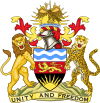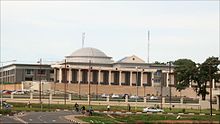
Politics of Malawi takes place in a framework of a presidential representative democratic republic, whereby the President of Malawi is both head of state and head of government, and of a multi-party system. Executive power is exercised by the government. Legislative power is vested in both the government and the National Assembly. There is a cabinet of Malawi that is appointed by the President of Malawi. The judiciary is independent of the executive and the legislature.

The Parliament of Canada is the federal legislature of Canada, seated at Parliament Hill in Ottawa, and is composed of three parts: the King, the Senate, and the House of Commons. By constitutional convention, the House of Commons is dominant, with the Senate rarely opposing its will. The Senate reviews legislation from a less partisan standpoint and may initiate certain bills. The monarch or his representative, normally the governor general, provides royal assent to make bills into law.

A member of parliament (MP) is the representative in parliament of the people who live in their electoral district. In many countries with bicameral parliaments, this term refers only to members of the lower house since upper house members often have a different title. The terms congressman/congresswoman or deputy are equivalent terms used in other jurisdictions. The term parliamentarian is also sometimes used for members of parliament, but this may also be used to refer to unelected government officials with specific roles in a parliament and other expert advisers on parliamentary procedure such as the Senate parliamentarian in the United States. The term is also used to the characteristic of performing the duties of a member of a legislature, for example: "The two party leaders often disagreed on issues, but both were excellent parliamentarians and cooperated to get many good things done."
Bicameralism is a type of legislature that is divided into two separate assemblies, chambers, or houses, known as a bicameral legislature. Bicameralism is distinguished from unicameralism, in which all members deliberate and vote as a single group. As of 2022, roughly 40% of the world's national legislatures are bicameral, while unicameralism represents 60% nationally and much more at the subnational level.
A motion or vote of no confidence is a formal expression by a deliberative body as to whether an officeholder is deemed fit to continue to occupy their office. The no-confidence vote is a defining feature of parliamentary democracy which allows the elected parliament to either affirm their support or force the ousting of the cabinet. Systems differ in whether such a motion may be directed against the prime minister only or against individual cabinet ministers.

A quorum is the minimum number of members of a group necessary to constitute the group at a meeting. In a deliberative assembly, a quorum is necessary to conduct the business of that group. According to Robert's Rules of Order Newly Revised, the "requirement for a quorum is protection against totally unrepresentative action in the name of the body by an unduly small number of persons." In contrast, a plenum is a meeting of the full body. A body, or a meeting or vote of it, is quorate if a quorum is present.

The speaker of a deliberative assembly, especially a legislative body, is its presiding officer, or the chair. The title was first used in 1377 in England.

The Parliament of the Republic of South Africa is South Africa's legislature; under the present Constitution of South Africa, the bicameral Parliament comprises a National Assembly and a National Council of Provinces. The current twenty-seventh Parliament was first convened on 22 May 2019.

The National Assembly is the legislature for Venezuela that was first elected in 2000. It is a unicameral body made up of a variable number of members, who were elected by a "universal, direct, personal, and secret" vote partly by direct election in state-based voting districts, and partly on a state-based party-list proportional representation system. The number of seats is constant, each state and the Capital district elected three representatives plus the result of dividing the state population by 1.1% of the total population of the country. Three seats are reserved for representatives of Venezuela's indigenous peoples and elected separately by all citizens, not just those with indigenous backgrounds. For the 2010 to 2015 the number of seats was 165. All deputies serve five-year terms. The National Assembly meets in the Federal Legislative Palace in Venezuela's capital, Caracas.

The Parliament of the Democratic Socialist Republic of Sri Lanka is the supreme legislative body of Sri Lanka. It alone possesses legislative supremacy and thereby ultimate power over all other political bodies in the island. It is modeled after the British Parliament.
Dissolution of a legislative assembly is the simultaneous termination of service of all of its members, in anticipation that a successive legislative assembly will reconvene later with possibly different members. In a democracy, the new assembly is chosen by a general election. Dissolution is distinct on the one hand from abolition of the assembly, and on the other hand from its adjournment or prorogation, or the ending of a legislative session, any of which begins a period of inactivity after which it is anticipated that the same members will reassemble. For example, the "second session of the fifth parliament" could be followed by the "third session of the fifth parliament" after a prorogation, but would be followed by the "first session of the sixth parliament" after a dissolution.

Malawi elects on the national level a head of state and government – the President – and a national assembly. The President and members of the National Assembly, elected simultaneously at a General Election, together form the Malawian Parliament owing to the President's role as both head of government and head of state. In practice however, the National Assembly is on par with the executive and is able to exercise oversight functions through investigations and public hearings on various matters including those involving the executive.

The National Assembly (Bulgarian: Народно събрание, romanized: Narodno Sabranie is the unicameral parliament and legislative body of the Republic of Bulgaria. The first National Assembly was established in 1879 with the Tarnovo Constitution.

The Parliament of Barbados is the national legislature of Barbados. It is accorded legislative supremacy by Chapter V of the Constitution of Barbados. The Parliament is bicameral in composition and is formally made up of two houses, an appointed Senate and an elected House of Assembly, as well as the President of Barbados who is indirectly elected by both. Both houses sit in separate chambers in the Parliament Buildings, in the national capital Bridgetown in Saint Michael.

The Parliament of Ghana is the legislative body of the Government of Ghana.

The Parliament of Botswana consists of the President and the National Assembly. In contrast to other parliamentary systems, the Parliament elects the President directly for a set five-year term of office. A president can only serve 2 full terms. The President is both Head of state and of government in Botswana's parliamentary republican system. Parliament of Botswana is the supreme legislative authority. The President of Botswana is Mokgweetsi Masisi, who assumed the Presidency on 1 April 2018 after winning the 2019 general election and returning his Botswana Democratic Party with a majority of 19 seats in the 65 seat National Assembly.

The National Assembly is the sole legislative body of Botswana's unicameral Parliament, of which consists of the President and the National Assembly. The House passes laws, provides ministers to form Cabinet, and supervises the work of government. It is also responsible for adopting the country's budgets. It is advised by the Ntlo ya Dikgosi, a council of tribal chiefs which is not a house of Parliament.
A parliamentary leader is a political title or a descriptive term used in various countries to designate the person leading a parliamentary group or caucus in a legislative body, whether it be a national or sub-national legislature. They are their party's most senior member of parliament (MP) in most parliamentary democracies.

The National Assembly is Mauritius's unicameral legislature, which was called the Legislative Assembly from 1968 until 1992, when the country became a republic. Prior to 1968 and under British rule it was known as the Legislative Council. The Constitution of Mauritius provides for the parliament of Mauritius to consist of the President and the National Assembly. The parliament of Mauritius is modelled after the Westminster system of parliamentary democracy, where members of parliament are voted in at regular general elections, on the basis of a first past the post system. The working language of the National Assembly is English.
In countries with a parliamentary system of government, contempt of parliament is the offence of obstructing the legislature in the carrying out of its functions, or in the hindering any legislator in the performance of their duties.

















